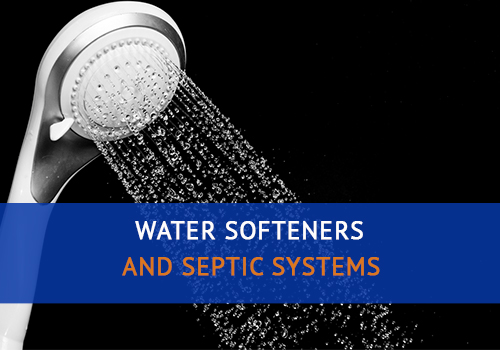For those that live in areas with high mineral content in their water, water softeners are key. But, for the population that also has septic systems, can you have both? Do water softeners and septic systems get along?
Let’s take a look at what a water softener is and how it works. While we are at, we will debunk a few myths and answer the question of if water softeners and septic tanks work together or against one another.

What is a Water Softener?
A water softener is a device used to “soften” or purify a home or commercial establishment’s water supply. Although people naturally believe it, not all water is pure.
Depending on where you live, water can contain a high concentration of minerals such as magnesium and calcium, which can make the entire solution “hard.”
For this reason, water softeners are designed to remove these minerals and provide a cleaner and more enjoyable drinking experience as well as less harsh on your pipes and hardware. Water softeners can cause water to be more effective during cleaning activities, it’s much less abrasive and corrosive on a building’s plumbing, as well as your hair and skin.
But what does this mean for your septic system and it’s naturally occurring bacteria?
Water Softeners and Septic Tanks
The answer isn’t as cut and dry as one would think, but most agree that water softeners and septic tanks get along. The exception being in instances when septic pump-outs are not performed at the new required frequency — but more on that in a moment.
Why Water Softeners Are Harmless
According to research reports from the University of Wisconsin, there is extensive evidence that indicates that water softener discharges do not harm the bacteria present in septic tanks.
Further, studies concluded that not only did the wastes from water softeners not interfere with the performance of the septic tanks in the experiment, but it led to the improvement of soil percolation, which is essential for septic systems.
Recently, the U.S. Environmental Protection Agency (EPA) reviewed the study (initially conducted in the 1970s). The EPA maintains that it remains valid today and into future years as the physics and chemistry of the soil that exists today have not changed.
With all the good news, it seems like a wrap. Well, not so fast.
Why Water Softeners Could Be Harmful
Water softeners remove minerals from the water, but those minerals don’t just disappear. They often solidify to create a brine.
Brine discharged from the water softener naturally produces salt, which gets absorbed by the septic tank and take up the necessary space needed for hard solids.
Due to different chemistries, the saltier water becomes dense and sinks. To make room, it lifts the sludge from the bottom of the septic tank to the top, which can lead to septic back-ups.
This means more frequent septic pump-outs may need to occur based on your household’s septic system usage and capacity.
The Verdict
It can be confusing to know how a water softener will affect your septic system. As a result, you should consult your septic tank service provider to monitor the performance of your septic tank if you have a water softener. If you have any questions, contact the Advanced Septic Services of Florida today.

